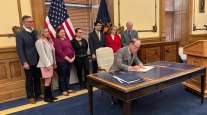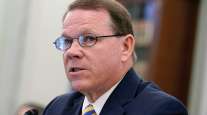Senior Reporter
Democrats Look to Budget, Bipartisan Bills to Advance Biden’s Infrastructure Plan

[Stay on top of transportation news: Get TTNews in your inbox.]
After the White House and Senate Republicans ended negotiations on an infrastructure package, congressional Democratic leaders announced their intention to rely on an intricate budget process to pass a key piece of the president’s domestic agenda.
Senate Majority Leader Chuck Schumer (D-N.Y.) expressed optimism that part of President Joe Biden’s $1.7 trillion American Jobs Plan on infrastructure would be realized via arcane congressional procedures.
RELATED: Biden-Capito infrustructure talks break off
“It may well be that part of the bill that’ll pass will be bipartisan and part of it will be through [budget] reconciliation,” Schumer recently told reporters. A reliance on certain budget rules would allow for maneuvering provisions through the chamber by a simple majority. The Senate’s Democratic caucus, consisting of 50 members, could essentially pass budget-centric infrastructure policy reflecting the priorities of the White House without Republican votes.
House Democrats in the majority would be expected to sign off on a Senate Democratic package. For those infrastructure provisions that do not meet congressional budgetary criteria, Schumer signaled the potential for attaching some of them to bipartisan legislation, such as a multiyear highway policy bill, stand-alone measures or the annual appropriations funding process.
Added Schumer: “We’re not going to sacrifice the bigness and boldness in this [infrastructure] bill. We will just pursue two paths and at some point they will join.”

Capito
Negotiations between the White House and Senate Republicans, led by West Virginia Sen. Shelley Moore Capito, ended due to disagreements over certain climate change provisions, criteria for infrastructure and the approach for funding such a massive policy package. The White House’s $1.7 trillion revised plan was met by a Senate Republican counteroffer of about $1 trillion. The White House aims to increase the corporate tax rate to about 28%, while the Senate GOP proposes tapping unused federal COVID-19 emergency aid.
“To ensure that the American Jobs Plan moves forward on a timely basis, the president spoke with Speaker [Nancy] Pelosi to consult with her on efforts to move forward on a jobs package in the House this month. In the same regard, the president also spoke with Senate Majority Leader Schumer to discuss the need to commence work on the budget resolution process so that legislation to advance the president’s economic priorities and tax reform plans could move to the Senate floor in July,” White House Press Secretary Jen Psaki said June 8. “The president is committed to moving his economic legislation through Congress this summer, and is pursuing multiple paths to get this done.”
In a statement ater the meetings with the White House, Capito explained disagreements between the sides could not be resolved.
“Despite the progress we made in our negotiations, the president continued to respond with offers that included tax increases as his pay-for, instead of several practical options that would have not been harmful to individuals, families, and small businesses,” she said.
Problem Solvers Caucus Infrastructure Framework by Transport Topics on Scribd
Meanwhile, a small group of bipartisan senators indicated they intend to negotiate with Democratic leaders on infrastructure matters. Separately, the 58-member bipartisan House Problem Solvers Caucus unveiled a $1.25 trillion, eight-year infrastructure spending framework, meant to facilitate bipartisanship.
“It’s critically important that we get a robust infrastructure package signed into law, and that we do it with strong bipartisan support,” said Rep. Josh Gottheimer (D-N.J.), the group’s co-chairman. “The Problem Solvers Caucus framework, ‘Building Bridges,’ does exactly that and tackles everything from electric vehicles to clean water to fixing our crumbling bridges, tunnels, roads and rail.
Hey @WhiteHouse and @SenateGOP, I heard some of your infrastructure talks have stalled, but the @ProbSolveCaucus has something to get America moving again. Our new bipartisan plan would pull our nation’s aging infrastructure into the 21st century. https://t.co/ez4xCgND09 — Rep. Kurt Schrader (@RepSchrader) June 9, 2021
“This is the model for how we should govern in Washington: Democrats and Republicans working together to find common ground.”
“The time is now for Congress and the administration to reach across the aisle, unite and boost investments in our surface transportation network that will move our transportation systems into the 21st century,” added Rep. Brian Fitzpatrick (R-Pa.), the caucus co-chairman.
Transportation policymakers in the House and Senate recently gave committee approval to multiyear highway policy bills. Congressional Democratic leaders say they plan on considering fiscal 2022 funding bills this month and pass aspects of Biden’s infrastructure plan by July 4.
Want more news? Listen to today's daily briefing below or go here for more info:




